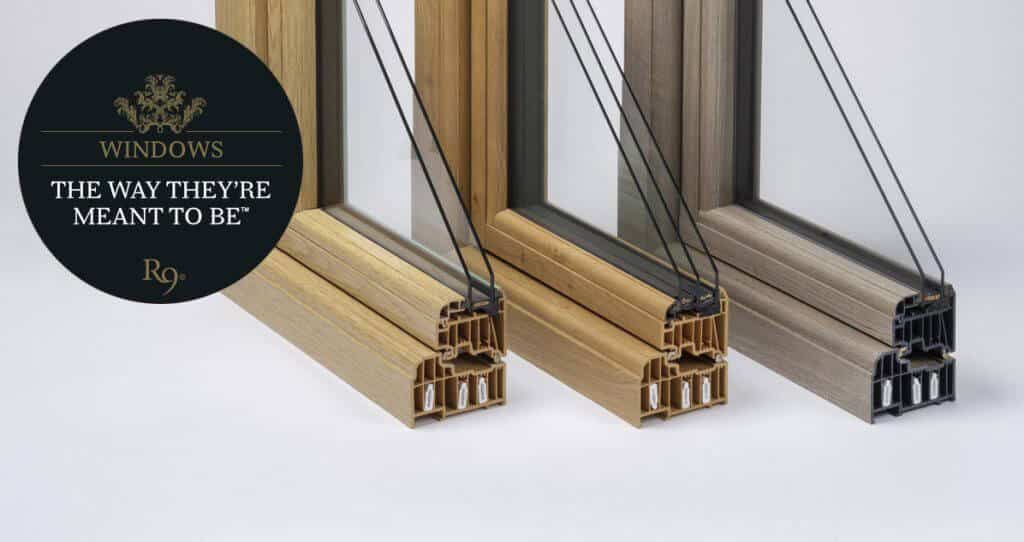Are you thinking of upgrading your glazing or building a new home? We’re here to help you understand the differences between double and triple glazing, the benefits of each type of glazing, and whether triple glazing is really worth the investment.
What Are Double Glazed Windows?
Double glazed windows have two panes of glass that sit within a sealed unit (also known as an insulating glass unit) surrounded by a frame. The material for the frame depends on the type of windows you have – uPVC, timber, and aluminium are the most popular choices for homes in the UK. The double glazing sealing unit has an air gap between the two glass panes which is filled with a layer of argon gas to help with insulation.
Double glazed windows are a modern window system that help with insulation and noise control. They are a popular choice for many homeowners as double glazed windows will usually meet the minimum thermal, ventilation and safety standards set out by building regulations.
What Do Double Glazed Windows Do?
Double glazed windows reduce noise, heat loss and condensation which is why they are such popular choice for modern homes.
The gas in the double glazing unit acts as an insulator reducing heat loss by on average 50%. Rather than heat escaping or cold air entering easily, double glazing acts as a barrier helping to reduce heating bills.
Noise travels using sound waves but the frequency of these waves is reduced by double glazing, quietening the sound on the other side of the window.
Condensation is reduced on the inside of double glazed windows as the window pane doesn’t get as cold as a single pane of glass. The air gap helps control the temperature, so moisture doesn’t fall below the dew point temperature. Condensation could occur between the window panes but this is unlikely unless the window has blown (the seal is no longer effective). Double glazed windows also contain crystalline desiccant within the sealing unit. This draws out moisture to prevent condensation from forming.
Double glazed windows combat the three main concerns for homeowners improving home efficiency.
What Are Triple Glazed Windows?
Triple glazed windows are similar in nature to double glazed windows with multiple panes of glass and argon gas between the panes, but they have three panes of glass within the window frame. Triple glazed windows are the most common window choice in Scandinavia and are growing in popularity in the UK.
Triple glazed windows, like double glazed windows, offer insulation against heat loss, reduce noise, and prevent condensation from forming.

Double Glazing vs Triple Glazing: What Type Of Glazing Do I Need?
With double glazing and triple glazing both offering similar benefits, but triple glazing costing significantly more, many people question whether there is any point in the additional spend. Let us discuss whether there really is a need for triple glazing or whether double glazed windows are sufficient for UK homeowners.
U-value is the measure for transfer of heat and the lower the value, the more energy-efficient an object is. Good double glazing can offer a U-value of 1.6 W/m²k and triple glazing can offer a U-value of 0.8 W/m²k. Both are significantly better than single glazing which offers a value of 5 W/m²k on average. Looking at the numbers and from the configuration of triple glazed windows, it’s fairly obvious that triple glazing windows have some advantages over other glazing options. Along with better energy efficiency ratings, triple glazed windows are more durable, long-lasting, can reduce condensation, and offer better security against break-ins.
Triple glazed windows can be double and sometimes triple the price of double glazed windows and you can expect a five-figure price tag. The specialist production required may make them harder to get hold of too. Triple glazed windows offer many great benefits but modern double glazing has advanced a lot and there may be other measures to boost your energy efficiency rating than forking out for triple glazing. Boosting double glazing with upgraded curtain or blind quality may offer sufficient heat loss reduction. Triple glazing can help reduce your heating bills but if you are swapping from good quality double glazing to triple glazing it can take a while to see the difference. You may also want to consider that with triple glazing, while less heat can escape on colder days, less natural warmth can enter your home on warmer days too.
There are pros and cons to both triple glazing and the environment is definitely a crucial component to consider. While Scandinavia, who have widely adopted triple glazing, experience colder climates, the UK isn’t necessarily on the same level. For UK homeowners the extra insulation may not be necessary. Glazing choice is a personal preference and if you can afford it and are building a new home, then consider it. But, if you are looking to update your glazing, modern double glazing is probably sufficient in terms of return.
 10-year guarantee
10-year guarantee Made in Britain
Made in Britain Variety of finance options
Variety of finance options 10+ years' experience
10+ years' experience